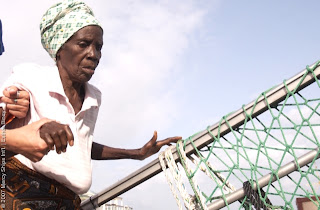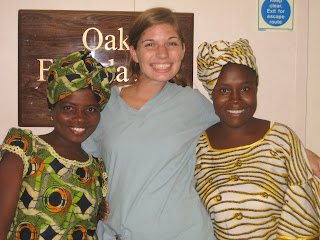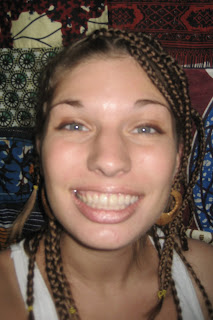
Hello again from Liberia :)
Walking to church on Sunday, my feet and ankles became completely covered in mud which was impossible to avoid in the swampy road which, in parts, has become one large puddle. One of the women at church, an usher, asked to take me out back to clean my feet. She refused to take "no" for an answer and she scrubbed my grubby feet until they were clean.
I came here to serve, yet I am being served.
Church started and the choir announced a special selection - an acapello song about called "Mama Liberia." I hope to somehow get a recording of this incredible song to bring home, because I have not heard anything like it before. Their voices were strong beautiful, and my eyes welled up as they sang so optimistically about their broken country, which they continued to thank God for.
I came here to bless, yet I am being blessed.
Isn't it ironic how the times when we are most willing to give are often the times when we actually receive the most? It does not take traveling across the world to learn this principle, as I'm sure most of you have experienced it on many levels in your own lives.
"He who finds his life will lose it, and He who loses his life for My sake will find it." --- Jesus [Matthew 10:39]
Enclosed are the first two ship reports for this Liberian outreach, incase you desire to know the details of what is being accomplished here. You will notice talk of eye surgeries, which I did not previously mention because I have not been caring for this patient population, whose care is done on an outpatient basis. The eye department, however, is doing amazing things for many Liberians through short, minimally invasive eye surgeries. They hosted a "Celebrate Sight" day last week, in which 185 of their patients came back for a post-op visit, a meal in our cafeteria, and a celebration of the restoration of many of their sight.
Thank you again for all of your prayers. I am safe and happy and healthy, and our patients are doing quite well overall - so I guess that means they are working. Thank you, also, for your encouraging responses to my emails. They are refreshing. I apologize to those who I have not had the chance to respond to yet, and will do my best in the days ahead.
Much Love,
Lindsay
Monrovia, Liberia July 2, 2007 -- The sacrificial labor of hundreds of volunteers, and the generous gifts of thousands of contributors, came together this past week to produce an historic moment in Mercy Ships history. On Monday, June 25, the first surgery was successfully completed onboard the charity's newest floating hospital, the Africa Mercy.
Ophthalmic surgeon and Mercy Ships Vice President for International Programs, Dr. Glenn Strauss, says the ship's very first patient, a 90-year-old woman with blinding cataracts, reported being able to see again before she even left his operating table. Patient Suah Paye was so overjoyed she literally danced around the surgical suite, singing and praising God for her restored sight.
Suah lived her entire life in a small village called Oil Town in West-Central Liberia. Along with her large family, Suah is a subsistence farmer; raising their own food along with a bit left over to sell in the market.
Three years ago, cataracts stole the last of Suah's sight. The loss was devastating for such a proud, active woman. She missed being able to work on her farm and missed fishing in the nearby river. She hated not being able to dress herself or even to use the toilet without assistance.
Suah thanked the doctors and nurses for her renewed vision, saying, "When I get home I will gather my people and tell them what you have done for me. I can't pay you, but God will pay you. He will bless you and your children and your children's children."
As Suah's onboard eye surgery got underway, obstetric screening began in the dockside tents for women suffering from birth injuries. Forty-nine women attended the screening. Most were scheduled for surgery over the coming weeks.
The first birth injury repair surgeries were conducted onboard the next day. Thirty-five year old Mamie Paye of North-Central Liberia was one of the patients selected to undergo the procedure on the new ship. Mamie has leaked urine constantly since she suffered a birth injury in 1995. She was abandoned by her husband as a result of the incontinence, a tragically common occurrence.
"Everyday I cry," Mamie says. "When you have this problem you don't have friends. You don't have nobody. People gossip the whole day about you. People abandon you. But God doesn't ever abandon nobody."
Suah and Mamie represent the first of hundreds of patients to be treated onboard the Africa Mercy during the remaining months of the Liberian field service, as well as the tens of thousands to be cared for without charge in the years to come.
As additional volunteers arrive and are trained, the Health Care team will ramp up their activities. The dental team is already seeing patients. Orthopaedic surgery will commence onboard on July 9. Plastic surgery will begin for burn patients in early September with maxillofacial operations being offered later the same month. Ear, nose and throat procedures are slated for October and November.
Mercy Ships is still seeking volunteers to fill positions for the balance of the Liberia field service. Some medical and community development projects are still in need of funding. To learn more write to info@mercyships.org.
Monrovia, Liberia 16 July 2007 -- The Mercy Ships Orthopaedic Surgical Team launched a ten-week program of operations onboard the Africa Mercy this past week. Patients have already been scheduled for more than half of the 100 free surgical slots reserved for orthopaedics. The first operation was conducted on Tuesday, July 10.
After several days spent screening potential patients, volunteer Orthopaedic Surgeon Dr. Brian Sims commented, "I think the thing that impresses me most is just how hardy the African people are; what they're able to put up with and continue to work and function in life in spite of what would normally be a completely disabling injury.
"There was a woman I saw yesterday, I think she was in her seventies, and she had a non-union fracture of her femur. So basically the center of her femur moved whenever she walked. Yet she walked in to the screening and she walked out again. When we told her we were going to schedule her for surgery, she just got the biggest smile and she put her hands in the air and she was praising God," Sims recalled.
The orthopaedic team has encountered a variety of injuries and physical defects; everything from polio deformities to old grenade and gunshot wounds sustained during the 14-year Liberian Civil War. However, more than half the surgeries scheduled to date are to correct club feet. Treating patients in their teens and even older with the deformity is not something Dr. Sims sees in his stateside practice.
He says, "The true, neglected club foot; the foot that's never had any treatment whatsoever is just really unheard of [in developed countries]. It's usually diagnosed within the first day of life. Here it's common to see people who've had a club foot all their lives."
Two children with club feet underwent free corrective surgeries during the first week of operations on the Africa Mercy. Two-year-old Cynthia Cooper and nine-year-old Benedict Menkoah had their feet straightened by Dr. Sims during operations that took several hours each. Both children have endured tremendous ridicule and persecution because of their deformities. Both were abandoned by their fathers.
Orthopaedic team member Dawn Crowther reported, "We especially enjoy being able to schedule the children. We've talked to teens and adults who've had the clubfeet or some other deformity. Many times they tell us they've never been to school because of the handicap. Maybe by helping them at such a young age we'll be able to impact the course of their lives, to give them a future they wouldn't otherwise have."
The orthopaedic team is partnering with medical professionals both on and off the ship to ensure adequate care continues even after the surgical team departs. Orthopaedic Care Coordinator Annie McFarland will see each patient every two weeks through September. Physical and occupational therapists volunteering with Mercy Ships will provide rehabilitation services. A Liberian prosthetics lab has generously offered to build and maintain any prosthetics the patients might need without charge.
Eight surgeons from the U.S. and the U.K. have agreed to fly into Liberia at their own expense to conduct the surgeries in the coming weeks. Volunteer surgeons are still needed for an even longer orthopaedic program planned for the ship's next port of call. Six full months of orthopaedic surgery are being scheduled for the field service to Sierra Leone in 2008.
For more information on this and other programs offered by Mercy Ships, write info@mercyships.org.








